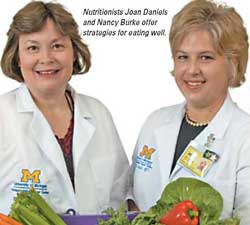Fads Fade Fast But Healthy Eating Sticks

By Joan Daniels, R.D., and
Nancy Burke, R.D.
Did you notice that leg warmers made a comeback this winter? Chances are, though, love'em or hate'em, wearing leg warmers won't impact your health. But your diet will. Think about it: Would you let the same folks who advised a generation of women to plaster their bangs up sky-high also tell you what you should eat? Didn't think so. When cancer is a part of your life, eating healthy is critical. But figuring out what that means gets confusing.
People look to food for all kinds of answers: to help them lose weight, to brighten their mood, to stop cancer. It's important to remember, though, that food is just that: food. It's not medicine, and although scientists are working hard to understand the chemical properties that make some foods healthier than others, the best thing to do is to keep your eye on the broader picture.
So rather than providing a list of "rules" for a healthy diet, we put together a list of guiding principles. The classics never go out of style.
Guiding Principles for Eating Well
Eat your fruits and vegetables!
Your mother said it, and she couldn't have been more right. Plants contain vitamins, minerals and nutrients called "phytochemicals." Phytochemicals fight cancer. And since scientists still don't fully understand how they all work together to keep you healthy, it's best to get your phytochemicals from food rather than supplements.
Try it; you might like it.
Yes, your mother told you that, too, and again, she was right. Phytochemicals come in almost as many forms as there are fruits and vegetables. Increased variety equals decreased risk. And if you don't like it the first time, give it a second chance. As you'll see from the recipes we've offered on our Web site, there's more than one way to skin an asparagus spear.
Cook more, if possible.
We know everyone's lives are busy, but making time to cook dinner is one of the best ways you can improve your diet. Prepackaged food and carry-out options usually don't offer much in the way of fruits and vegetables. Also, they're more likely to contain hidden ingredients like extra fat, salt and sugar.
Moderation is key.
If you don't have the best eating habits, don't try to change them all overnight. Don't obsess over "good" and "bad" foods. As you gradually introduce healthier foods into your diet, you'll find you crave fat, sugar and salt less and less.
Use common sense.
We all know deepfried foods and desserts should be rare treats. Remember, a cookie is still a cookie, even if the package says it's healthy.
Try out some new recipes (opens as a .pdf document).
